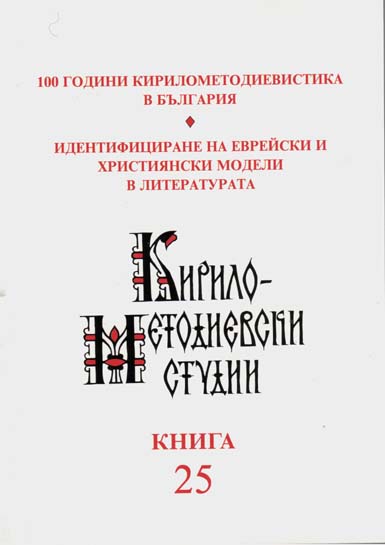Poetry as a Component of Old Testament Narrative Texts: Notes on Palaea Historica
Poetry as a Component of Old Testament Narrative Texts: Notes on Palaea Historica
Author(s): Małgorzata SkowronekSubject(s): Language studies
Published by: Кирило-Методиевски научен център при Българска академия на науките
Keywords: Palaea Historica
Summary/Abstract: The Palaea Historica was created at the end of the 9th century based on Old Testament narratives compiled together with non-narrative material of diverse provenance: homiletic elements (anathemas against dualist heretics, commentaries on the poetic interpretations of certain biblical characters and events) as well as, for the most part, poetic texts used for liturgical purposes. In over 60 chapters of the Greek text, and over 50 of the two Slavic translations of the Palaea Historica, we find a total of ca. 60 fragments from the Book of Psalms, the Great Canon of Repentance by St. Andrew of Crete, as well as other works of Orthodox liturgical poetry – e.g. feast day canons by St. John of Damascus and St. Cosmas of Maiuma. The choice of the material testifies to the high level of literary culture of the author of the Palaea and his knowledge of the contemporary relevant Greek works. The poetic characteristics of the text, as well as the comparison of the two Slavic translations, show that the latter are composed with due attention to the integrity of the Greek text of the Palaea Historica, without external borrowings. The quoted fragments are not distributed evenly: they are not appended to narratives based on extra-biblical sources (e.g. the story of Abraham or of young Moses). Furthermore, they are regularly introduced by means of markers such as ‘the Hymnographer/Singer says, mentions, testifies’, sometimes including the attribution of the cited fragment. A meticulous perusal of the poetic fragments of the Palaea Historica leads to the conclusion that this function of the work – secondary though it may be – can be considered an instrument of propagating liturgical and biblical poetry in the Byzantine-Slavic literature and cultural sphere.
Journal: Кирило-Методиевски студии
- Issue Year: 2016
- Issue No: 25
- Page Range: 468-488
- Page Count: 21
- Language: English
- Content File-PDF

